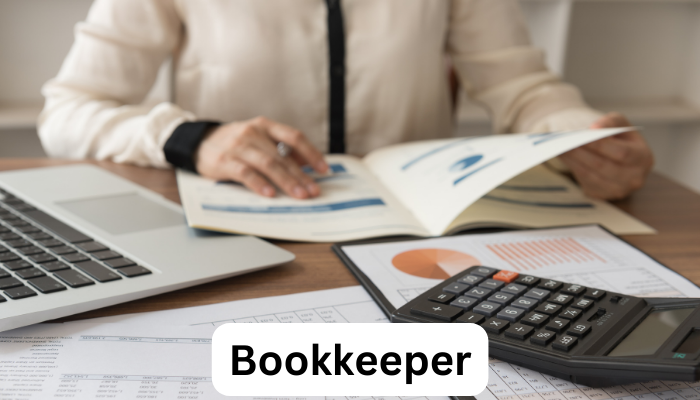
Bookkeeper vs Accountant vs CPA
While all these professionals deal with the finances of an organization, then where does the difference lie between bookkeeper vs accountant vs CPA? If all of them are meant to be number knacks and juggle between digits, how come their educational backgrounds and sets of required training and skills differ from each other?
This article is going to provide a detailed insight into the basic differences and responsibilities of bookkeepers, accountants, and certified public accountants (CPAs).
Bookkeeper
A bookkeeper is an administrative professional who maintains the financial recordings of an organization in an accurate and consistent manner so that the accountants can perform their tasks on time. The regulation of your company’s financial records on a daily basis involves complete sets of information on customer transactions, payrolls, loans, invoices, and supplier purchases.

In terms of differentiating between the duties of a bookkeeper vs accountant vs CPA, the tasks of bookkeeping are much more flexible as they can work either independently or in a team of similar service providers. For instance, a bookkeeper can pen down the numbers of all customer transactions and the products they purchase within a day.
That’s why they are sometimes referred to as ledgers – because one of the main duties is to maintain a primary ledger. However, the complexities and variations in ledging can range from a single sheet to using an entire software, such as QuickBooks, that comes with diversified versions.
Click here to read about the benefits of QuickBooks.
Accountant
Accounting and bookkeeping may look like a similar job at first glance, but the details reveal that the role of accountants is more analytical and complex. To put it in simple words, every accountant is a bookkeeper, but not all bookkeepers can be accountants.
The provision of all sorts of financial assistance and guidance to offer financial projections and advise on relevant elements that influence the growth behooves of the accountants of your organization.
Analyzing and binding multiple financial indicators with regular reporting and insights help the company focus on the areas that need improvement and those that are already talking to the skies.
For example, an accountant creates a cash flow statement and files an income tax return for the organization that employs them, along with various other responsibilities, by utilizing different relevant versions of accounting and financial software.
However, it is recommended to go through their non-neglectable downsides, such as the disadvantages of QuickBooks Online.
Certified Public Accountant
One of the most prestigious titles you can earn in the field of accounting is a certified public accountant, abbreviated as CPA. After having quite an experience, you can register for the CPA examination with the official and regulatory bodies of your residential state and pass the test to earn the accreditation.
Potential clients for CPAs can be individuals, government agencies, businesses, and non-profit organizations.
The basic role of CPAs is to help individuals and businesses in the preparation and filing of taxation returns. In the case of the Internal Revenue Service (IRS) audit, contacting a trustworthy and experienced CPA will be your first line of defense.
Talking about CPA vs accountant, the former has higher credibility as they prepare transaction reports and update accounting records to represent their clients in front of the IRS. They help business tycoons and their well-established corporations reach financial goals and maintain their reputations by keeping their taxation implementations in check.
The Ultimate Showdown: Bookkeeper vs Accountant vs CPA
Now that you know the basic differences between their jobs, it is time to consider how a bookkeeper vs accountant vs CPA differ with respect to educational background and required technical and soft skills.
1. Training
Bookkeeping doesn’t bind you with the necessity of having a college degree, unlike the professions of accounting and CPA, for which you must possess at least a bachelor’s level of qualification in accounting, business administration, taxation, or relevant subjects.
Bookkeepers have received training related to money management, data entry, payrolls, finances, and special software required to keep the records of payroll, data analysis, and POS systems. The advancement level in the stages of education for a bookkeeper vs accountant vs CPA aligns with the increasing complexity in practicality.
2. Credentials
Typically, bookkeepers don’t need accounting certifications. This profession offers you flexibility in a variety of ways – you can either work independently or with a team by grasping a few skills in hand to start working in bookkeeping while simultaneously planning for further education. Doing so will maximize the pool of prospective opportunities that can make you excel in the long run.
Accountants and CPAs are often recruited based on their qualifications. Certain auditing and taxation services require you to qualify the CPA exam held by the officials of your country. Normally, auditing and attestation, business environment, financial accounting, reporting, and regulation are a few sections of the exam.
3. Technical & Soft Skills
Soft skills such as effective communication, mathematical abilities, computation, automation, software management, and detail orientation are a few to count. The major difference between a bookkeeper vs accountant vs CPA is demonstrated in terms of relevant expertise.
Whatever the skills a bookkeeper possesses, such as money management, data entry, spreadsheets, organization, arithmetic, and financial mathematics, are not sufficient enough to provide financial advice, completion of tax filings, or create financial reports or budgets which certify the necessity to hire competent accountants and CPAs.
4. Income
Depending on the extent of expertise and number of years of experience you have in the industry, multiple analytics show that the median annual income of bookkeepers, accountants, and CPAs ranges from $43,000, $54,000, and $80,000, respectively.
Why hire a bookkeeper instead of an accountant?
Hiring a bookkeeper over an accountant may be ideal for businesses seeking efficient, cost-effective financial management. Bookkeepers specialize in keeping accurate records, overseeing day-to-day transactions, and producing timely financial reports that may prove more efficient and less costly for operations than hiring an accountant directly. Their focused role makes them ideal for small businesses with straightforward financial needs, while the difference between cpa and bookkeeper lies in qualifications and services. CPAs offer comprehensive financial expertise and strategic insight, while bookkeepers specialize in routine tasks to ensure operational efficiency and regulatory compliance. CPA vs bookkeeper the CPA and bookkeeper relationships provide each business with unique benefits; CPAs excel at complex financial analysis and should be employed regularly for periodic reporting and strategic planning; bookkeepers allow businesses to reduce costs, streamline daily financial operations, and achieve financial accuracy more cost-effectively while still taking advantage of expert CPA advice when needed for higher-level matters.
Final Thoughts
Opting for a bookkeeper vs accountant vs CPA as a career is an individualized approach that you must choose according to your preferences by determining your liability comfort level. Summarizing the content, all the busy and hectic tasks of managing payrolls, generating reports, and the reconciliation of accounts are done by bookkeepers. And if you wish to have a bigger picture of these reports, accountants will be your go-to persons, while CPAs will cope with tricky transactions of your firm and maintain your reputation before the IRS.
Also Check: Professional Bookkeeping Services

